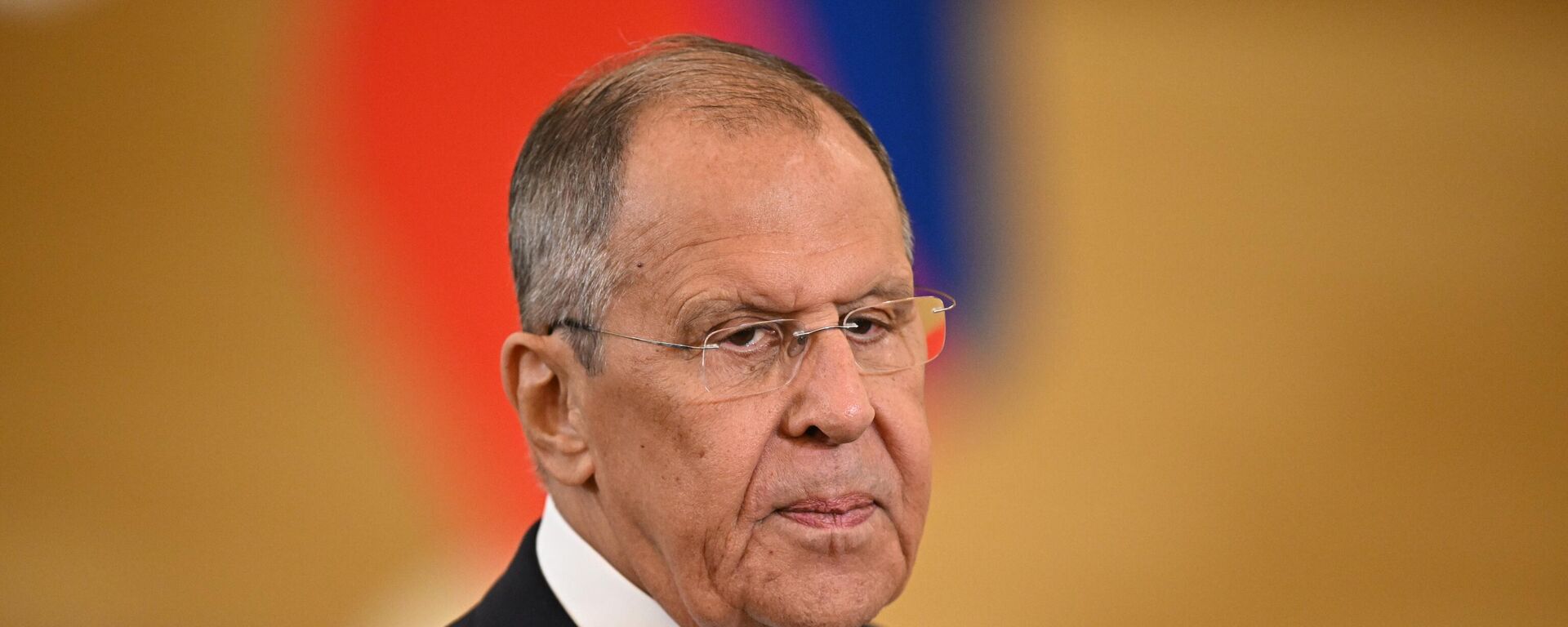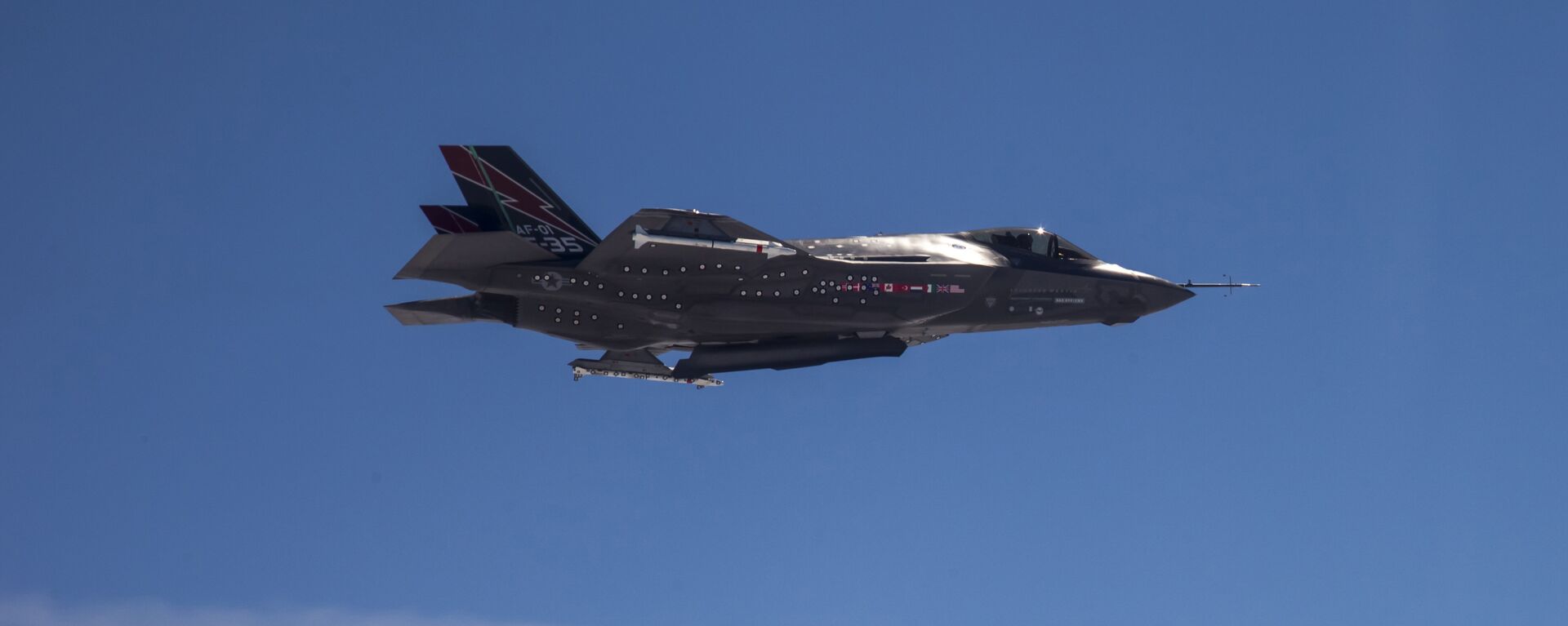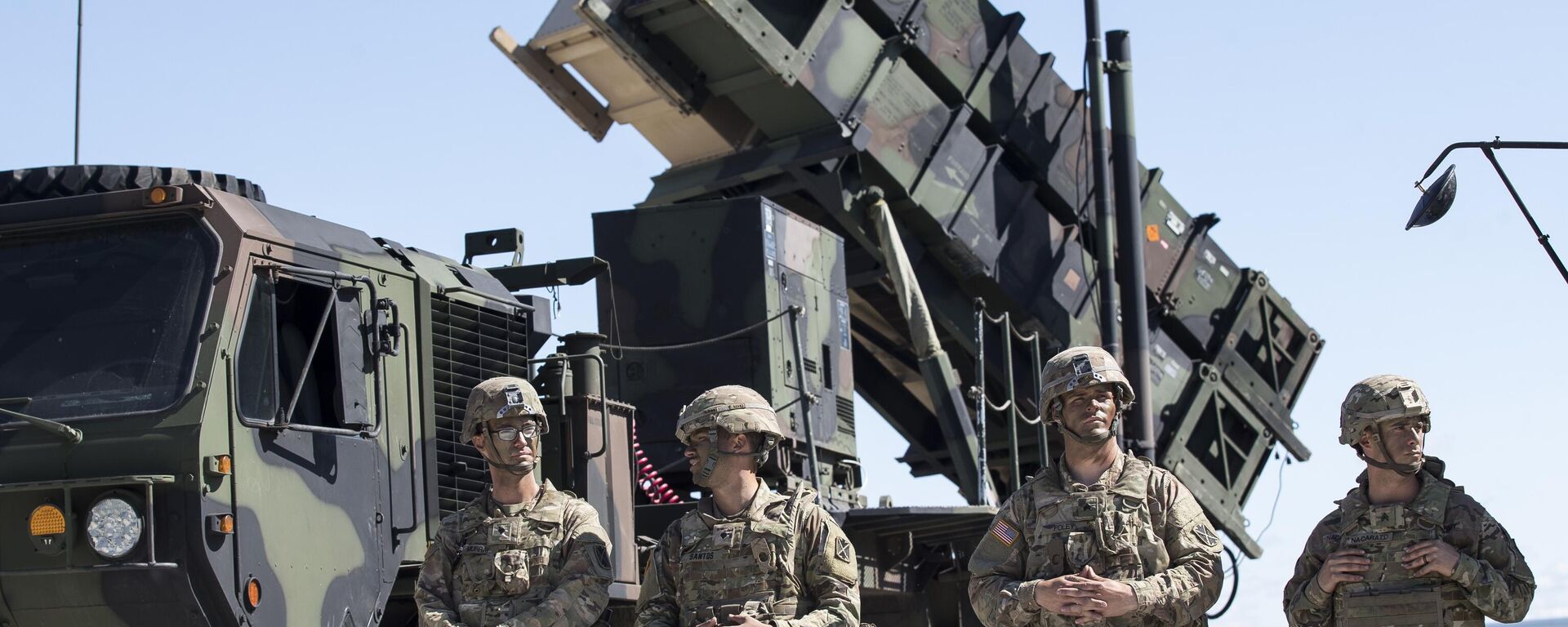https://sputnikglobe.com/20241011/us-defense-contractor-raytheon-making-billions-profiting-from-weapons-for-ukraine-1120506151.html
US Defense Contractor Raytheon Making Billions From Weapons for Ukraine
US Defense Contractor Raytheon Making Billions From Weapons for Ukraine
Sputnik International
US defense contractor Raytheon is profiting handsomely off of the Ukraine war, an analysis by a Sputnik correspondent of the company's financial reports reveal.
2024-10-11T03:31+0000
2024-10-11T03:31+0000
2024-10-11T03:31+0000
military
military & intelligence
sergey lavrov
raytheon
ukraine
germany
russia
nasams
javelin
us army
https://cdn1.img.sputnikglobe.com/img/07e6/07/07/1097041922_0:106:3027:1809_1920x0_80_0_0_728d0ef7468af162506ec1e713a447dd.jpg
Raytheon Missiles & Defense (RMD), the subsidiary specializing in missile production under the RTX Corporation, has produced the National Advanced Surface-to-Air Missile Systems (NASAMS) directly for Ukraine, while the Stinger and Javelin missiles manufactured by the company have been sent to the conflict zone since early 2022. As a manufacturer of air defense systems such as the Patriot and the missiles used by such systems, RMD has received new orders for these missile systems after such weapons were sent to Ukraine by other Western countries.Russia has repeatedly stated that arms supplies to Ukraine lead to further escalation of the conflict and directly involve NATO countries in it. Russian Foreign Minister Sergey Lavrov said that any cargo containing weapons for Ukraine would become a legitimate target for Russia. The United States and NATO are directly involved in the conflict, including not only by supplying weapons, but also by training personnel, Lavrov said. Raytheon has seen five consecutive quarters of sales growth since the fourth quarter of 2022, after struggling with sales decline for four consecutive quarters before that, the company’s latest earnings report showed. Details from the earnings reports of Raytheon illustrate how the US defense contractor has been able to make billions from continued US military aid to Ukraine and turn its business prospects around by taking advantage of the new demands. Raytheon's backlog, which refers to signed but unfilled defense contracts, also expanded from $63 billion at the end of 2021 to $77 billion at the end of the second quarter of this year, according to the latest earnings report. New orders for RMD began to dry up from the fourth quarter of 2021 with an 8% year-on-year drop, the company’s earnings reports showed. By the second quarter of 2022, RMD had experienced a third consecutive quarter of sales decline, with an 11% drop from the same period of the previous year. However, RMD's new orders in the second quarter of 2022 had already begun to show signs of increasing demand for its products following the escalation of the military conflict in Ukraine in early 2022. Of the $3.56 billion in new sales for RMD in the second quarter of 2022, about $662 million, or 18.6%, came from the Stinger replenishment for the US Army. In the early days of the full escalation of the military conflict in Ukraine, the US sent over 1,000 Stinger anti-aircraft missiles to Kiev. RMD secured a deal for the Stinger replenishment in May 2022. By the fourth quarter of 2022, new orders driven by growing demands for missiles for Ukraine allowed RMD to post a 6% year-on-year sales growth after four consecutive quarters of sales drop. The $698 million deal for National Advanced Surface-to-Air Missile System (NASAMS) for Ukraine accounted for about 17% of the $4.1 billion worth of new sales for RMD in the fourth quarter of 2022. In the following quarters, as the US military sent additional missiles to Ukraine, new missile orders continued to flow to RMD. In June 2023, RMD secured a $1.15 billion contract for AIM-120 D-3 and C-8 Advanced Medium-Range Air-to-Air Missiles (AMRAAM), which was the largest AMRAAM contract to date. The deal was expected to supply the missiles to 18 countries, including Ukraine. The deal accounted for 28.8% of RMD’s $4 billion in new sales in the second quarter of 2023. Although RTX decided to merge RMD with Raytheon Intelligence & Space in its third-quarter 2023 earnings report, new missile production requirements stemming from the military conflict in Ukraine continued to drive the company's new sales growth. In the fourth quarter of 2023, $2.8 billion worth of the Guidance Enhanced Missile (GEM-T) production accounted for about 40% of the $6.9 billion in quarterly new sales at the newly merged subsidiary known simply as Raytheon under RTX. The GEM-T missiles are an important part of the missiles used in the Patriot air defense system. After transferring its own Patriot systems to Ukraine, Germany had to place new orders at Raytheon this year. Germany first signed a contract for a new Patriot system in March, and the $1.2 billion new order accounted for about 18% of Raytheon's $6.7 billion in new sales in the first quarter of this year. In July, Germany signed a new contract with Raytheon for an additional Patriot system, also valued at $1.2 billion. In addition to new orders for the Patriot system, the Javelin Joint Venture, set up by Raytheon in collaboration with Lockheed Martin, was awarded a production contract with a total value of $1.3 billion by the US Army in August. After the US sent thousands of the Javelin anti-tank missiles to Ukraine, the Javelin Joint Venture was tasked with ramping up production to replenish the supply for the US Army with the goal of producing 3,960 Javelin missiles per year by late 2026. According to the latest figures from the Pentagon, the impact of US military aid to Ukraine on the domestic industrial base stood at $36.8 billion as of August 8. The military-industrial bases in Arkansas and Pennsylvania profited the most by receiving $2.98 billion and $2.07 billion, respectively. States that received over $1 billion included Alabama, Arizona, California, Florida, Texas and West Virginia. An analysis by market research firm Vertical Research Partners forecasted that the top five US defense contractors would see $26 billion in cash flow by the end of 2026, the Financial Times reported in August. In addition to making profits from the military conflict in Ukraine, US defense contractors like Raytheon also stood to gain from continued US military support for Israel amid the escalating tensions in the Middle East. The Israeli Defense Ministry said in August that it had completed the 500th flight of the military supply airlift operation, transporting 50,000 metric tons of military equipment from the US. The transported military equipment included armored vehicles, munitions, ammunition, personal protection gear and medical equipment, which the ministry said were "crucial for sustaining the IDF's [Israel Defense Forces] operational capabilities during the ongoing war."
https://sputnikglobe.com/20241007/sergey-lavrov-ukraine-and-its-puppeteers-play-with-fire-restoring-peace-not-part-of-their-plan-1120458863.html
https://sputnikglobe.com/20240912/us-uk-scramble-to-supply-ukraine-with-amraam-missiles-1120116806.html
https://sputnikglobe.com/20230612/raytheon-to-give-ukraine-5-patriot-systems-by-end-of-2024-1111087679.html
ukraine
germany
russia
Sputnik International
feedback@sputniknews.com
+74956456601
MIA „Rossiya Segodnya“
2024
Sputnik International
feedback@sputniknews.com
+74956456601
MIA „Rossiya Segodnya“
News
en_EN
Sputnik International
feedback@sputniknews.com
+74956456601
MIA „Rossiya Segodnya“
Sputnik International
feedback@sputniknews.com
+74956456601
MIA „Rossiya Segodnya“
raytheon profiting from ukraine, war profiteering in ukraine, us contracts for ukraine, raytheon military contracts
raytheon profiting from ukraine, war profiteering in ukraine, us contracts for ukraine, raytheon military contracts
US Defense Contractor Raytheon Making Billions From Weapons for Ukraine
MOSCOW (Sputnik) - US defense contractor Raytheon, the world’s largest producer of guided missiles, has been profiting from Ukraine-related military supplies despite previously struggling with sales up until the start of the Ukraine conflict in February 2022, a Sputnik correspondent’s analysis of the company’s earnings reports showed.
Raytheon Missiles & Defense (RMD), the subsidiary specializing in missile production under the RTX Corporation, has produced the National Advanced Surface-to-Air Missile Systems (NASAMS) directly for Ukraine, while the Stinger and Javelin missiles manufactured by the company have been sent to the conflict zone since early 2022. As a manufacturer of air defense systems such as the Patriot and the missiles used by such systems, RMD has received new orders for these missile systems after such weapons were sent to Ukraine by other Western countries.

7 October 2024, 11:30 GMT
Russia has repeatedly stated that arms supplies to Ukraine lead to further escalation of the conflict and directly involve NATO countries in it. Russian Foreign Minister Sergey Lavrov said that any cargo containing weapons for Ukraine would become a legitimate target for Russia. The United States and NATO are directly involved in the conflict, including not only by supplying weapons, but also by training personnel, Lavrov said.
Raytheon has seen five consecutive quarters of sales growth since the fourth quarter of 2022, after struggling with sales decline for four consecutive quarters before that, the company’s latest earnings report showed.
Details from the earnings reports of Raytheon illustrate how the US defense contractor has been able to make billions from continued US military aid to Ukraine and turn its business prospects around by taking advantage of the new demands.
Raytheon's backlog, which refers to signed but unfilled defense contracts, also expanded from $63 billion at the end of 2021 to $77 billion at the end of the second quarter of this year, according to the latest earnings report.
New orders for RMD began to dry up from the fourth quarter of 2021 with an 8% year-on-year drop, the company’s earnings reports showed. By the second quarter of 2022, RMD had experienced a third consecutive quarter of sales decline, with an 11% drop from the same period of the previous year.
However, RMD's new orders in the second quarter of 2022 had already begun to show signs of increasing demand for its products following the escalation of the military conflict in Ukraine in early 2022.
Of the $3.56 billion in new sales for RMD in the second quarter of 2022, about $662 million, or 18.6%, came from the Stinger replenishment for the US Army. In the early days of the full escalation of the military conflict in Ukraine, the US sent over 1,000 Stinger anti-aircraft missiles to Kiev. RMD secured a deal for the Stinger replenishment in May 2022.
By the fourth quarter of 2022, new orders driven by growing demands for missiles for Ukraine allowed RMD to post a 6% year-on-year sales growth after four consecutive quarters of sales drop.
The $698 million deal for National Advanced Surface-to-Air Missile System (NASAMS) for Ukraine accounted for about 17% of the $4.1 billion worth of new sales for RMD in the fourth quarter of 2022.
In the following quarters, as the US military sent additional missiles to Ukraine, new missile orders continued to flow to RMD.
In June 2023, RMD secured a $1.15 billion contract for AIM-120 D-3 and C-8 Advanced Medium-Range Air-to-Air Missiles (AMRAAM), which was the largest AMRAAM contract to date. The deal was expected to supply the missiles to 18 countries, including Ukraine. The deal accounted for 28.8% of RMD’s $4 billion in new sales in the second quarter of 2023.

12 September 2024, 12:07 GMT
Although RTX decided to merge RMD with Raytheon Intelligence & Space in its third-quarter 2023 earnings report, new missile production requirements stemming from the military conflict in Ukraine continued to drive the company's new sales growth.
In the fourth quarter of 2023, $2.8 billion worth of the Guidance Enhanced Missile (GEM-T) production accounted for about 40% of the $6.9 billion in quarterly new sales at the newly merged subsidiary known simply as Raytheon under RTX. The GEM-T missiles are an important part of the missiles used in the Patriot air defense system.
After transferring its own Patriot systems to Ukraine, Germany had to place new orders at Raytheon this year. Germany first signed a contract for a new Patriot system in March, and the $1.2 billion new order accounted for about 18% of Raytheon's $6.7 billion in new sales in the first quarter of this year.
In July, Germany signed a new contract with Raytheon for an additional Patriot system, also valued at $1.2 billion.
In addition to new orders for the Patriot system, the Javelin Joint Venture, set up by Raytheon in collaboration with Lockheed Martin, was awarded a production contract with a total value of $1.3 billion by the US Army in August.
After the US sent thousands of the Javelin anti-tank missiles to Ukraine, the Javelin Joint Venture was tasked with ramping up production to replenish the supply for the US Army with the goal of producing 3,960 Javelin missiles per year by late 2026.
According to the latest figures from the Pentagon, the impact of US military aid to Ukraine on the domestic industrial base stood at $36.8 billion as of August 8. The military-industrial bases in Arkansas and Pennsylvania profited the most by receiving $2.98 billion and $2.07 billion, respectively. States that received over $1 billion included Alabama, Arizona, California, Florida, Texas and West Virginia.
An analysis by market research firm Vertical Research Partners forecasted that the top five US defense contractors would see $26 billion in cash flow by the end of 2026, the Financial Times reported in August.
In addition to making profits from the military conflict in Ukraine, US defense contractors like Raytheon also stood to gain from continued US military support for Israel amid the escalating tensions in the Middle East.
The Israeli Defense Ministry said in August that it had completed the 500th flight of the military supply airlift operation, transporting 50,000 metric tons of military equipment from the US.
The transported military equipment included armored vehicles, munitions, ammunition, personal protection gear and medical equipment, which the ministry said were "crucial for sustaining the IDF's [Israel Defense Forces] operational capabilities during the ongoing war."





